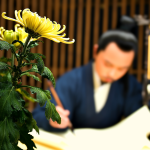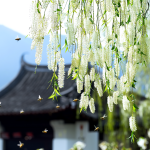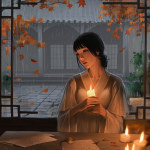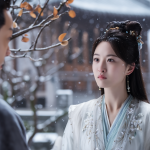葬花吟
《葬花吟》出自《红楼梦》第二十七回,是林黛玉在暮春时节因感花落而作。全诗借“葬花”抒发对生命短暂和青春消逝的悲叹,同时暗示自己寄人篱下的处境与悲剧命运。通过“质本洁来还洁去”等句,展示她高洁孤傲的性格。诗中多重象征和抒情手法表现了诗人对自我命运的深刻感知,被誉为《红楼梦》诗词的巅峰之作,也是中国古典文学中极具感染力的咏物抒怀诗。
文章目录[隐藏]
《葬花吟》原文

(清·曹雪芹)
花谢花飞花满天,红消香断有谁怜?
游丝软系飘春榭,落絮轻沾扑绣帘。
闺中女儿惜春暮,愁绪满怀无释处。
手把花锄出绣闺,忍踏落花来复去。
柳丝榆荚自芳菲,不管桃飘与李飞。
桃李明年能再发,明年闺中知有谁?
三月香巢已垒成,梁间燕子太无情!
明年花发虽可啄,却不道人去梁空巢也倾。
一年三百六十日,风刀霜剑严相逼。
明媚鲜妍能几时,一朝漂泊难寻觅。
花开易见落难寻,阶前闷杀葬花人。
独倚花锄泪暗洒,洒上空枝见血痕。
杜鹃无语正黄昏,荷锄归去掩重门。
青灯照壁人初睡,冷雨敲窗被未温。
怪奴底事倍伤神?半为怜春半恼春。
怜春忽至恼忽去,至又无言去不闻。
昨宵庭外悲歌发,知是花魂与鸟魂?
花魂鸟魂总难留,鸟自无言花自羞。
愿奴胁下生双翼,随花飞到天尽头。
天尽头,何处有香丘?
未若锦囊收艳骨,一抔净土掩风流。
质本洁来还洁去,强于污淖陷渠沟。
尔今死去侬收葬,未卜侬身何日丧?
侬今葬花人笑痴,他年葬侬知是谁?
试看春残花渐落,便是红颜老死时。
一朝春尽红颜老,花落人亡两不知!
中文翻译(意译)
花儿凋零花瓣飞舞漫天飘散,红消香逝无人怜惜为哪般?
柔丝飘荡萦绕春日亭台,柳絮轻扬扑向绣帘。
深闺中的少女感伤春日将尽,满心忧愁无处排遣。
手执花锄走出绣房,忍心踏着落花来回徘徊。
柳枝榆荚自顾芬芳,哪管桃花李花飘零纷飞。
桃花李花来年还能再开,来年深闺中还有谁在?
三月里香巢已筑好,梁间燕子却如此无情!
来年花儿再开虽可啄食,却不知人已离去梁空巢倾。
一年三百六十天,风如刀霜似剑相逼迫。
明媚鲜妍能有多久?一旦飘零便难寻觅。
花开易见落难寻,台阶前愁煞葬花之人。
独自倚着花锄暗自垂泪,泪水洒上空枝似血痕。
杜鹃默默无语正值黄昏,扛着花锄回去掩上重门。
青灯映照墙壁人初入睡,冷雨敲打窗户被子未温。
为何我如此伤神?一半怜春一半恼春。
怜春忽然到来又恼它忽然离去,到来时默默无语离去时无声无息。
昨夜庭外传来悲歌,不知是花魂还是鸟魂?
花魂鸟魂终究难留住,鸟儿默默无言花儿含羞。
愿我胁下生出双翼,随花飞到天尽头。
天尽头,哪里有埋葬香花的净土?
不如用锦囊收殓艳骨,一抔净土掩埋风流。
本质洁净而来也应洁净而去,强过陷落污浊沟渠。
如今你死去我来收葬,却不知我何时也会丧命?
我今葬花被人笑痴,他年葬我可知是谁?
试看春残花渐凋零,便是红颜老死之时。
一旦春尽红颜老去,花落人亡彼此不知!
英文翻译(许渊冲 译)
The Burial of the Fallen Flowers
The blossoms fade and falling fill the air,
Of fragrance and bright hues bereft and bare.
Floss drifts and flutters round the painted bower,
Or softly strikes against the curtained door.
A girl in her chamber mourns the passing spring,
No comfort from her heart's unrest she'd bring.
She goes out with a hoe to bury flowers fair,
And steps on fallen blooms again and there.
Willows and elms, fresh and fair,
Let petals float and fall with careless air.
Peach and plum will bloom again next year,
But who will be here when they reappear?
In March the swallows built their nest with care,
But now, most unfeeling, they don't seem to spare.
Next year when flowers bloom they may come again,
But not when people have gone and left the plain.
A hundred days a year, the wind and frost so stern,
Like knives and swords the beauty doth subvert.
How long can beauty bloom fresh and fair?
Once gone, it will forever disappear.
It's easy to see flowers bloom, but not when they fall,
Before my steps the mourner pines and palls.
Alone, leaning on my hoe, tears drop like rain,
They leave blood-red marks on twigs they stain.
The cuckoo silent, dusk is drawing nigh,
I come back with my hoe and shut the door high.
The dim lamp casts my shadow on the wall,
Cold rain beats on window as quilt feels small.
Why should I be more sad than others are?
Half for the spring's departure, half for its flare.
I grieve its coming and going in haste,
It comes in silence and goes without taste.
Last night from courtyard came a song of woe,
Was it the soul of flowers or birds that flow?
The soul of flowers and birds can hardy stay,
Birds have no words, flowers blush for their decay.
Would I could have wings to follow flowers' flight,
And fly with them to the end of day and night.
Where on earth can be found a fragrant grave?
Better shroud the fair petals in a clean grave.
Pure and clean you came, pure and clean you go,
Rather than sink in mire or drift with the flow.
Now you are dead I come to bury you,
But how can I know when my own time is due?
They laugh at me for mourning flowers' fate,
But who will bury me when I am late?
See spring depart and flowers fall one by one,
This is the season when beauty is done.
When spring has gone and beauty fades away,
Flowers fall, man dies, none knows of the day.
背景补充
《葬花吟》是《红楼梦》第二十七回“滴翠亭杨妃戏彩蝶,埋香冢飞燕泣残红”中的经典诗作,为女主角林黛玉所作。此诗以落花为喻,通过“葬花”这一行为,抒发了林黛玉对青春易逝、生命无常的深切悲叹,同时隐喻了她自身的命运悲剧。
- 创作情境:
黛玉因误会宝玉(前夜未开门相见)而心生哀怨,又逢暮春时节落花满地,触景生情,次日便荷锄葬花,并吟诵此诗。诗中“一年三百六十日,风刀霜剑严相逼”暗指她在贾府寄人篱下的压抑处境;“质本洁来还洁去”则体现了她高洁孤傲、不愿妥协的性格。 - 象征意义:
落花象征美好事物的消逝,也隐喻黛玉自身的命运——如花般纯洁却终将凋零。诗中反复出现的“他年葬侬知是谁”“花落人亡两不知”等句,既是对落花的哀悼,也是对自身悲剧结局的预感。 - 文学价值:
此诗融合了曹雪芹对人生无常的哲学思考与对女性命运的深切同情,语言哀婉凄美,情感层层递进,是《红楼梦》诗词艺术的巅峰之作,亦被誉为中国古典文学中最具感染力的咏物抒怀诗之一。










